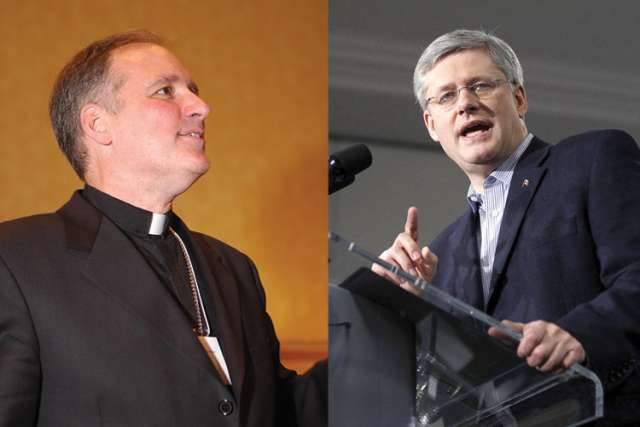In a lengthy letter, made public April 22, conference president Archbishop Paul-André Durocher touched on impending genocide in Africa, the war in Syria, the aggression against Ukraine, violence in Venezuela, the threats to the environment and threats to indigenous rights posed by Canadian-owned mining companies in Latin America as well as threats to human dignity at home.
“We also continue to worry about the devaluing of human life that marks our country when we consider both life’s beginning and ending,” Durocher wrote. “The way our society cares for those who are waiting to be born and those who await death is a powerful sign of our appreciation for the sanctity of human life itself.
“The lack of such care can only lead to the denial of the intrinsic dignity of every human being,” the archbishop said. “We need as a country to look again at the directions we have taken and are taking in this regard.”
Durocher began the four-page letter with a warning of genocide against Muslims in the Central African Republic that followed a period of “severe reprisals against Christians.” Thousands have fled their homes; a million people need food, he said. Though Muslims and Christians “are found on each side of the conflict,” religious differences “are used here and elsewhere as an excuse to justify violence.”
He also listed as further examples Nigeria and Cameroon, where an elderly Canadian nun, Sr. Gilberte Bussière, and two Italian priests were recently kidnapped.
The archbishop urged the Canadian government “to look for ways that our country can help stabilize civil governments and food security throughout Africa.”
He then turned to the ongoing civil war in Syria that has left 10 million people displaced. He thanked the government for its “generous financial assistance” to neighbouring countries sheltering Syrian refugees.
“We greatly appreciate the role of the federal Office and Ambassador for Religious Freedom in promoting religious freedom and protesting cases of religious discrimination and persecution, particularly in the Middle and Far East,” Durocher said. At the same time, he implored Harper to “find ways to simplify and speed up immigration processes for refugees wishing to come to Canada, and for ensuring health and other benefits for those who have succeeding in getting here.”
A number of dioceses, parishes, religious and community groups “have been waiting for months” to receive Syrian refugees, but the number that have successfully arrived in the country “is just a pitiful handful,” he said.
Durocher reminded Harper about Pope Francis' appeal for peace in Venezuela after weeks of violent protests and the Holy Father’s concern about the way Latin American natural resources are being exploited by foreign interests “which fail to respect their environment, aboriginal peoples, and the needs of surrounding communities, resorting instead to lawlessness, intimidation and unfair advantages.”
Latin American bishops have directed their criticisms especially against “international companies registered in Canada,” he said.
Durocher asked that the government “encourage Venezuela in the pursuit of dialogue for resolving its problems.” He also urged, on behalf of the bishops, the Canadian Catholic Organization for Development and Peace and other NGOs, the establishment of an independent ombudsman “who would hear complaints and help establish greater accountability standards” for mining and extraction companies registered in Canada.
“We thank you for speaking out so firmly about the sovereignty and rights of Ukraine,” Durocher wrote, advising the Prime Minister he had earlier written Ukraine’s bishops that Canada’s bishops and Catholics here were united with them in pleading “for the guarantee of all rights and liberties in Ukraine, particularly the right to life and dignity, freedom of conscience and religion, and liberty of expression and self-government.”
The archbishop noted the recent education funding commitment to Canada’s aboriginal peoples.
“In encouraging you and aboriginal leaders to co-operate in mutual consultation and collaboration, my brother bishops and I are fully aware of many difficult challenges that lie ahead.”
He urged finding “more effective ways of ensuring respect for aboriginal cultural traditions, the responsible role of indigenous peoples in determining their economic, educational and developmental needs, and in reaffirming their cultures, values and communities,” he said. “An important part of this involves developing together a sound economic base.
“Yet even more it demands shared vision and mutual respect,” Durocher said.

